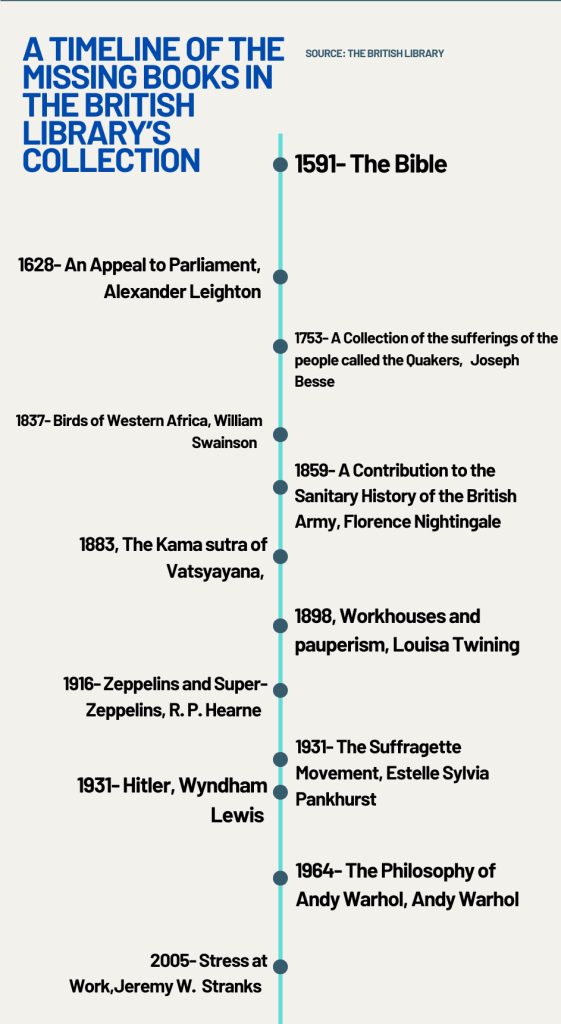The British Library has lost more than 42,000 books and manuscripts since 1997, data provided by the organisation has shown.
Some of the older books in the collection which are lost, dating from as early as the late 1500s, are rare copies of manuscripts or first edition books, which could be worth thousands of pounds.
The library, founded in 1973, has had the right to receive a free copy of every item published or sold in the United Kingdom, meaning it has amassed a collection of 170 million items, with 14 million of those being books and manuscripts.
A selection of the British Library’s most valuable lost or mislaid books, some of which are potentially worth tens of thousands of pounds, are revealed in the graph below.
The most expensive is a copy of the Bible from 1706, which is almost four times as expensive as the second highest.
The value of books and manuscripts is based on their condition, the quality of their production and their rarity, along with other factors which can significantly change their monetary worth.
First edition novels have sold for thousands of pounds, especially when they are a part of a rare imprint or are a rare translation of a foreign text.
The British Library has lost three Charles Dickens original issues and there has been consistent demand for first editions from the famed Victorian author, whose books have been turned into films and television programmes.
Peter Harrington, a London bookseller of rare and collectible texts, has had the same first edition Dickens novels up for sale as those lost by the British Library, with a copy of The Life and Adventures of Nicholas Nickleby being worth £1,750.
An assistant librarian working for a London-based scientific institution said that while most of the time misplaced books are not necessarily lost, it is mainly due to disorganisation that the library does not know where they are.
He added that classification systems, which organise library items into specific categories, must be kept up to date for books to be easily retrievable.
He said: “If a librarian fails to write a retrieval slip and if books are not checked out properly, things can easily be misplaced.”
A trainee librarian at a London university library said that it is easy to lose items if they have been put into storage and have not been taken out for many years.
She said: “Some libraries give people too much trust. In some libraries, there are ‘regulars’ and in these cases books do not go through the catalogue, so people take them away and then do not bring them back.”
Many of the older books and manuscripts in the British Library’s collection have come from older libraries which merged with the institution at the time of its creation, such as the Old Royal Library, the Sir Hans Sloane’s collection and the Cotton Library.
The range of books and manuscripts the British Library has mislaid originated across a vast period of time, and some of these lost items show the cultural changes which have happened in Britain across the past few centuries.
From early versions of Protestant Bibles translated into English to a book outlining the effects that stress has on modern day workers, the British Library has lost items connected to all ends of Britain’s history, as is shown in the timeline below.

A regular user of the British Library’s workspaces and collection, Esmee Portelli, said she was disappointed to hear they had lost so many books and hoped they could be easily retrieved.
She said: “I understand that people make mistakes, so I do not want to be too critical of a team who I imagine are working really hard and taking their job seriously.”
The 42,050 missing books and manuscripts have made up 0.02% of the library’s overall collection and 0.3% of their written works.
The library began making these records in 1997, meaning some of the books and manuscripts may have gone missing before then.
The British Library declined to comment.
Featured image credit: Patche99z via Wikimedia Commons under CC BY-SA 3.0 licence





